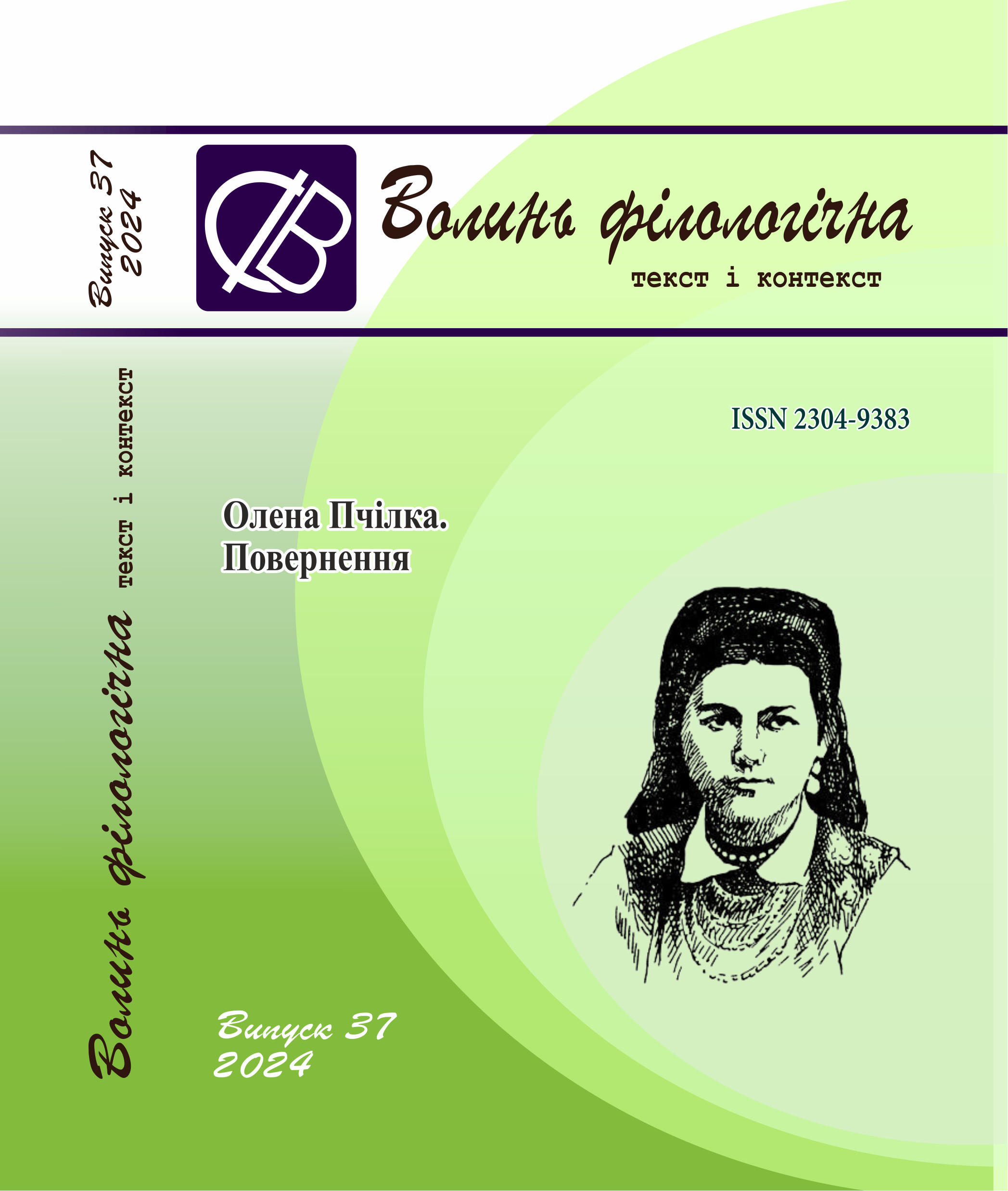”Orlove hnizdo” by Оlena Pchilka: text and context
DOI:
https://doi.org/10.29038/2304-9383.2024-37.pasAbstract
The article is devoted to the analysis of Olena Pchilka's unpublished historical poem «Orlove hnizdo». Some printed fragments do not allow us to fully understand the depth of the author's poetic thinking and all the facets of her artistic talent. Therefore, the purpose of the article is to study the history of the poem, its composition, and poetic features. To achieve this goal, the article uses textual and biographical methods, as well as a combination of comparative and cultural-historical approaches.
As a result, it was found that the poem was fully completed by 1890. The author even planned to publish it in the magazine «Zorіa». It is difficult to understand why this did not happen. Thus, some parts of her best work were lost. The writer believed that she would never write anything better, because she had put her whole soul into this poem. Lesіa Ukrainka highly appreciates «Orlove hnizdo», preferring it even to M. Starytsky's novel «Molodist Mazepy».
In fact, Olena Pchilka's poem has more echoes with the play «Hetman Doroshenko» by L. Starytska-Cherniakhivska, published in 1911. Both works are quite similar thematically, but the main differences are determined by the choice of genre: a historical play in five acts by Starytska-Cherniakhivska, a lyrical epic by Olena Pchilka. This also affected the differences in the plot.
«Orlove hnizdo» occupies a special place among Olena Pchilka's poems. The writer has six works of the specified genre. The author quickly evolves from folklore themes in «Rusalka» to higher cultural registers: reinterpreting well-known biblical stories («Iudita», «Prorok», «Debora») and describing national history («Kozachka Olena», «Orlove hnizdo»). In both historical poems, Olena Pchilka refers to the times of Petro Doroshenko's hetmanship (1665–1676). The period of Ruin was particularly interesting because of the events that took place in Ukrainian life at that time.
Conclusions. The theme successfully tested by Olena Pchilka was continued in the Ukrainian literary process of that time. It is worth mentioning here the novelist and playwright M. Starytskyi, as well as the authors of the younger generation - L. Starytska-Cherniakhivska and Lesіa Ukrainka.
References
Виноградський, Ю. (1927). Марія Дорошиха: З Сосницької старовини. Історико- Географічний Збірник, Т. І, 33–35.
Грушевський, М. (1967). Ілюстрована історія України. Нью-Йорк: Видавництво Чарторийських.
Колодяжинська (1912). Подоріж до Чигирина. Рідний край, 3, 13–19.
Літопис Самовидця (1971). Київ: Вид-во «Наукова думка».
Луговий, О. (1942). Визначне жіноцтво України. Торонто: Накладом автора.
Петровський, М. (1930). Нариси з історії України XVII – початку XVIIІ століть: Досліди над літописом Самовидця. Харків: Державне видавництво України. Том 1.
Пчілка, О. (1971). Лист О. Борковському від 27(08).ХІІ(І).1889(1890). Леся Українка. Документи і матеріали. Київ: Наукова думка.
Пчілка, О. Лист В. Лукичу від 10(22).ХІ.1890. ІЛ. Ф. 61. Од. зб. 820.
Пчілка, О. Орлове гніздо. Чистовий автограф. Інститут літератури імені Т. Г. Шевченка АН України. Ф. 28. Од. зб. 42.
Пчілка, О. (1990). Орлове гніздо. Поема (уривки). Соціалістична культура, 10, 12–13.
Пчілка, О. (1910). Петро Дорошенко (З поеми “Орлове гніздо”). Рідний край, 39, 5–7.
Романов, С. (2019). «Бояриня» Лесі Українки та «Гетьман Дорошенко» Л. Старицької-Черняхівської: діалог текстів у співвіднесенні історіософських підходів. Волинь філологічна: текст і контекст, 26, 156–177.
Семенко, С. (2010). Олена Пчілка – редактор «Газети Гадяцького земства». Образ: щорічний науковий збірник, 11, 76–82.
Смолій, В., Степанков, В. (2011). Петро Дорошенко. Політичний портрет. Київ: Темпора.
Старицька-Черняхівська, Л. (2000). Драматичні твори. Проза. Поезія. Мемуари. Київ: Наук. думка.
Українка, Леся. (2021). Повне академічне зібрання творів у 14 томах. Луцьк: Волинський національний університет імені Лесі Українки.
Шевченко, Т. (2012). Кобзар. Харків: Клуб сімейного дозвілля.

